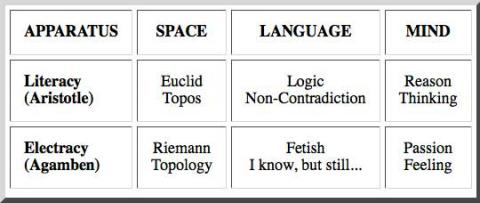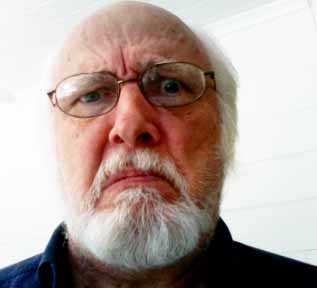
Coming into focus is the understanding of chora as interface aligning experience, history, nature, technology within an apparatus. Appiphany consults on this relationship as an appropriation of Being (Ereignis), specifically as well-being relative to bare life. The existential insight into Western metaphysics and its commitment to the ends of "life" as reality, noted that human entelechy ends in death (humans are the animals capable of death). Potentiality is the opposite of entelechy as a relation with Being. The experience most instructive of human capacity as potentiality is love (passion). The relevant point for choragraphy is that electrate metaphysics emerges out of love (passion) and its expression in art, in the way that literate metaphysics emerged out of reason (logic) and its expression in science. It is worth being reminded that when we say "metaphysics" we mean the functioning of language invented to support intelligence in the literate apparatus, from the beginnings in philosophy to institutionalized science today. "Chora" names the opening in nature making room for human freedom to come into its own, to manage mind, language, society and nature.
Our project is to design and test an experimental electrate metaphysics, developing the dimension of chora neglected in literacy. Agamben describes the qualities and functionality of chora relevant to a practice of choragraphy.
The topology that is here expressed tentatively in the language of psychology has always been known to children, fetishists, "savages," and poets. It is in this "third area" that a science of man truly freed of every eighteenth-century prejudice should focus its study. Things are not outside of us, in measurable external space, like neutral objects of use and exchange; rather, they open to us the original place solely from which the experience of measurable external space becomes possible. They are therefore held and comprehended from the outset in the topos outopos (placeless place, no-place place) in which our experience of being-in-the-world is situated. The question "where is the thing?" is inseparable from the question "where is the human?" Like the fetish, like the toy, things are not properly anywhere, because their place is found on this side of objects and beyond the human in a zone that is no longer objective or subjective, neither personal nor impersonal, neither material nor immaterial, but where we find ourselves suddenly facing these apparently so simple unknowns: the human, the thing. (Agamben, Stanzas, 59).
A functionality for Appiphany is to map the location and movements, the topology, of this zone of the third area. This context demystifies to some extent the positive value placed within Modernism on the productions of "children, fetishists, savages, and poets." The capacities of signification found in their works are a relay for electrate reason, to supplement the propositional logics of conceptual thinking. Meanwhile, Agamben gives special place to the troubadour poets, to clarify this choral dimension as the "pure experience of the existence of language," with an emphasis on "experience." In a practice as much philosophical as literary, the poets (including Dante) "grasped the pure existence of language by means of the figure of a woman who was held to be the supreme love object and through whom the mother tongue was explicitly opposed to grammar (Potentialities, 71). This case clarifies the exact quality of the experience as potentiality.
Here man is not always already in the place of language, but he must come into it; he can only do this through appetitus, some amorous desire, from which the word can be born if it is united with knowledge. The experience of the event of language is, thus, above all an amorous experience. The birth of the mind from which the word is born, is thus preceded by desire, which remains in a state of agitation until the object of desire is found. According to this conception, the amorous desire from which the word is born is more originary than inventio as a rememorization of the being-given of the word. With the Provencal poets, the classical topics is already definitively surpassed. What they experience as trobar goes definitively beyond inventio. The troubadours do not wish to recall arguments already in use by a topos, but rather they wish to experience the topos of all topoi, that is, the very taking place of language as originary argument, from which only arguments in the sense of classical rhetoric may derive. Thus the topics can no longer be a place of memory in the mnemonic sense. Now it is presented in the traces of the Augustinian appetitus as a place of love. Amors is the name the troubadours gave to the experience of the advent of the poetic word and thus, for them, love is the razo de trobar par excellence. (Agamben, Language and Death, 68).
Heuretics, as the methodology used to compose a poetics of electrate metaphysics, thus, to pass from topos to chora, must extend the logic of invention from inventio to trobar, both for its own practice, and as a pedagogy.

